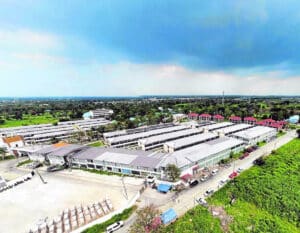Gov’t orders freezing of Porac Pogo assets

Executive Secretary Lucas Bersamin ordered on Thursday the freezing of funds and preservation of the 46 buildings and the entire 10-hectare compound of Lucky South 99 in Porac town, Pampanga, and the summary deportation of its rescued foreign workers.
Bersamin is the chair of the Presidential Anti-Organized Crime Commission (PAOCC), which led the raid on the vast illegal Philippine offshore gaming operator (Pogo) hub early this month.
In a memorandum, Bersamin directed Anti-Money Laundering Council Chair Matthew David to apply for a freeze order or a provisional asset preservation order from the court.
“The application shall cover all assets within the compound where Lucky South 99 Corp. is situated that are linked to unlawful activity as defined by [Republic Act No.] 9160 (Anti-Money Laundering Act of 1991) as amended,” he said.
According to Bersamin, the assets to be frozen or preserved would include the whole compound of the illegal Pogo and all the vehicles found parked within the compound.
READ: Inventory of items in Porac Pogo hub done; letter with Roque’s name found
He also directed Justice Secretary Jesus Crispin Remulla “to facilitate the summary deportation” of the illegal Pogo’s 156 foreign nationals rescued on June 4 at the company’s hub in Porac town.
Bersamin asked Remulla to “blacklist said individuals to bar their reentry into the Philippines, subject to applicable laws, rules and regulations.”
Torture victims
Winston Casio, PAOCC spokesperson, told reporters that the foreigners were held at Nasdake Building in Pasay City, which is being used by PAOCC as a temporary detention center for rescued foreign Pogo workers.
PAOCC initially said that 158 foreigners were rescued from Lucky South 99. They included 126 Chinese, 23 Vietnamese, four Malaysians, four Myanmar nationals and a Korean.
On Thursday, Casio said there were actually 160 foreigners, four of them victims of torture and human trafficking.
READ: 158 foreigners, 29 Filipinos rescued from Pogo hub in Pampanga
One of the rescued Chinese men was handcuffed to a metal bed frame and had severe bruises on his body.
Another Chinese man who was picking mango fruits near the compound was also arrested after he tried to dupe authorities into believing that he was a torture victim.
But when authorities noticed the photos and videos of dead people on his cellular phone, he was considered a “torture master” for Pogo workers who failed to follow the management’s orders.
Leak
On the night of June 4, authorities led by PAOCC raided the Lucky South 99 compound located inside the vast Royal Garden Estate that straddles Angeles City and Porac.
The raiding team managed to intercept only 158 foreigners and 29 Filipinos who were already boarding vehicles to escape.
Video footage obtained by PAOCC showed that hours before the actual raid, hundreds of Pogo workers were seen hurriedly coming out of buildings and running toward the gate, as if they were tipped off about the impending raid.
Casio said that had not a “leak” of supposedly confidential information happened, at least 1,000 Pogo workers would have been rescued.
The raid continued until June 5, but authorities could no longer enter the compound after a Malolos City court that issued the search warrant against Lucky South 99 withdrew it based on legal technicalities.
On June 5, seven more Filipinos voluntarily went out of the Pogo firm’s gate after authorities used megaphones to call out people remaining inside the compound.
Job losses
Meanwhile, the Department of Labor and Employment is projecting around 22,000 job losses in Metro Manila should the government adopt proposals from lawmakers and other groups to close down all Pogos.
In an interview on radio station dzRh Thursday, Labor Secretary Bienvenido Laguesma said a transition period should be considered so that the government could assist the workers who would be displaced.
“We are in a difficult position to give a categorical statement that we do not want [Pogos]. We don’t want the illegal [ones], that’s clear. For the legitimate, we have a concern if the closure is abrupt. If the decision is to shut down all of them, maybe there should be a transition period so we can prepare our workers who will be affected by the closure in the new jobs that they may find,” he said.
On concerns about the social cost of Pogos, Laguesma said these should be balanced with the fact that legitimate Pogos contribute to the economy.
“If the social cost really weighs more, then we should really create a system to alleviate the plight of the [Filipino] workers so that they won’t be negatively affected,” he said.
Laguesma added that another 8,000 foreigners, mostly Vietnamese, working for internet gaming licensees who were issued alien employment permits (AEPs) from January to April could also lose their jobs if the 50 legitimate Pogos in Metro Manila were shut down.
‘Security risk’
However, retired officers of the Armed Forces of the Philippines have joined the calls of some lawmakers for the “immediate and complete closure” of Pogos, arguing that they “pose serious security risk.”
In a statement on June 19, the Association of General and Flag Officers said many of these gambling outlets were used as fronts by organized crime groups for human trafficking, prostitution, kidnapping, cyberscam, illegal drug trade, torture, surveillance and cyberattack on government agencies.
“They not only adversely affect the income, growth and investment opportunities of legitimate gaming sites like the casinos but also create negative perception of gambling that deters players from considering legal gaming establishments,” they added.
They pointed out that to maintain and operate 85 percent of some 300 Pogo platforms without valid documents, the illegal franchisees “have to bribe government officials to buy their silence and cooperation.”
“This unholy alliance between the Pogo and government officials attracts criminal syndicates to engage in illegal activities leading to national insecurity,” they pointed out. —WITH A REPORT FROM NESTOR CORRALES